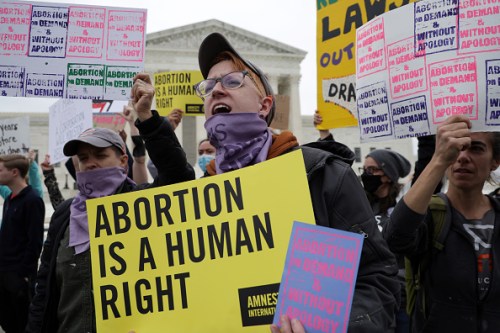If you’re reading this, you’ve probably heard the news that late Monday night, Politico published a leaked Supreme Court draft decision written by Justice Samuel Alito that explicitly aims to overturn Roe v. Wade, the landmark 1973 case that legalized abortion at the federal level.
Experts in This Article
trans activist, civil rights attorney, and clinical instructor at Harvard Law School’s Cyberlaw Clinic.
vice president of policy and strategic engagement at Lawyers for Good Government
This leaked draft ruling addresses Dobbs v. Jackson Women’s Health Organization, a pending Supreme Court case deliberating the constitutionality of a 15-week abortion ban in Mississippi. In 2018, Mississippi passed a law that effectively banned abortions after 15 weeks—undermining the ruling set in place by Roe v. Wade, which determines states cannot ban abortion before a fetus is viable outside of the womb (more specifically, before 24 weeks).
If the Supreme Court solidifies the decision, people in nearly 23 states could wake up with restricted abortion access or an all-out ban overnight, says Alejandra Caraballo, trans activist and attorney, formerly with Transgender Legal Defense Fund (TLDEF). The good news, though complex, is that this leaked opinion is still a draft which means that abortion is still the law of the land.
What does this leaked draft mean for abortion rights
“It’s not over yet,” says Mika Fernandez, Vice President of Policy and Strategic Engagement at Lawyers for Good Government (L4GG). The fact of someone leaking is marginally hopeful and gives organizers, citizens, and legislators some time to react. “This leaked opinion means that there is time and hope for action or organization, at least before it becomes an official statement.”
Action and organization might include organizing at a community level to support existing abortion funds and potentially advocating for state legislature to protect individual state abortion access, Fernandez says, stressing that this last action is critical because a formal overturning of Roe v. Wade wouldn’t make abortion illegal for everyone in the United States. If the draft opinion is published and made official, abortion rights will be solely determined by individual states, which was the case before 1973, Fernandez says. And according to the Center for Reproductive Rights, there are 23 states where abortion could or would be banned immediately.
What are the broader implications of this leaked draft
“This is one of the most unprecedented leaks in the history of the Supreme Court,” says Caraballo. And Caraballo adds that it is not unreasonable to fear for overall contraceptive access or to have concerns about the potential for criminalizing miscarriage. University of Iowa PhD candidate Berkley Conner, who specializes in reproductive justice rhetoric, agrees that existing legislative efforts and rhetoric don’t indicate that regulations will end with abortion.
It may seem helpful to try to be positive or encouraging and reassure people that birth control won’t be illegal, but Conner asserts that considering the bigger picture and worst-case scenarios are of the utmost importance right now when there’s still a sliver of time between this leak and an official decision statement.
“It’s absolutely reasonable to fear for access to reproductive health care necessities like abortion, most immediately and contraception or the criminalization of such things like miscarriage,” says Conner. “Never before has the United States Supreme Court so directly intended to strip away existing rights that the Supreme Court has previously established,” Caraballo added.
Oh hi! You look like someone who loves free workouts, discounts for cutting-edge wellness brands, and exclusive Well+Good content. Sign up for Well+, our online community of wellness insiders, and unlock your rewards instantly.
Sign Up for Our Daily Newsletter
Get all the latest in wellness, trends, food, fitness, beauty, and more delivered right to your inbox.
Got it, you've been added to our email list.











